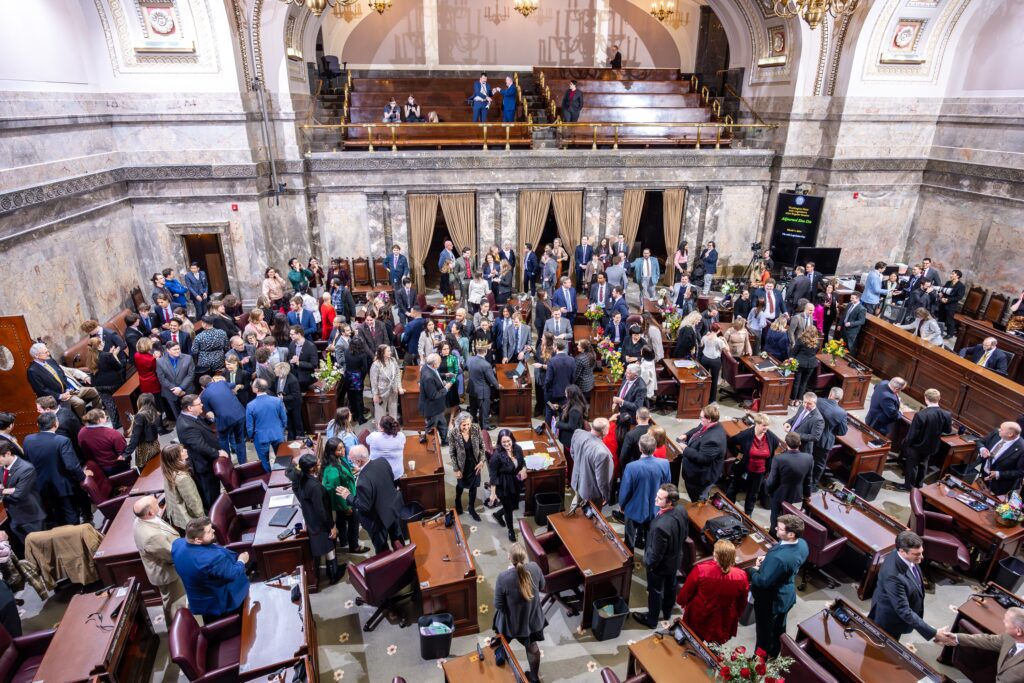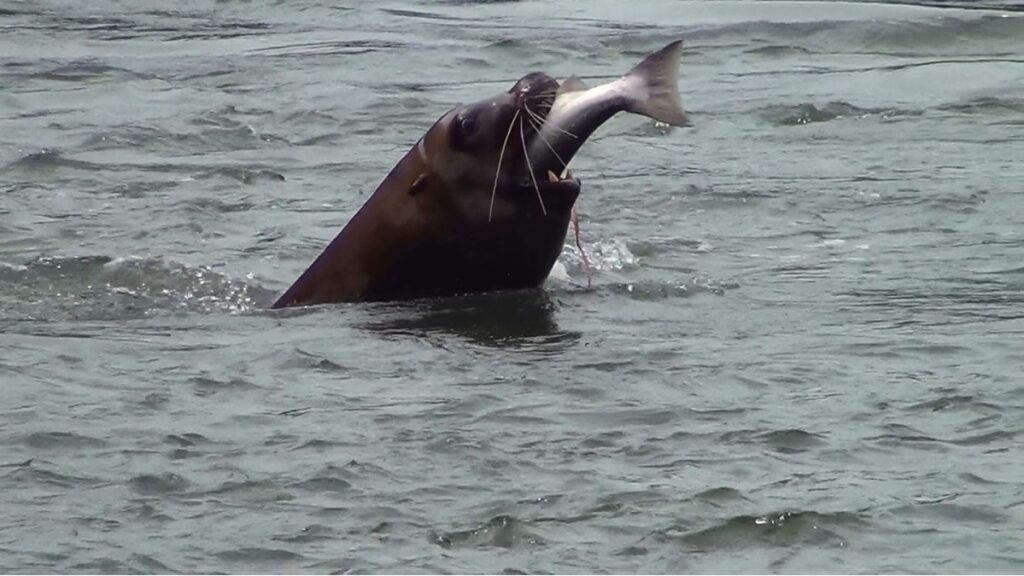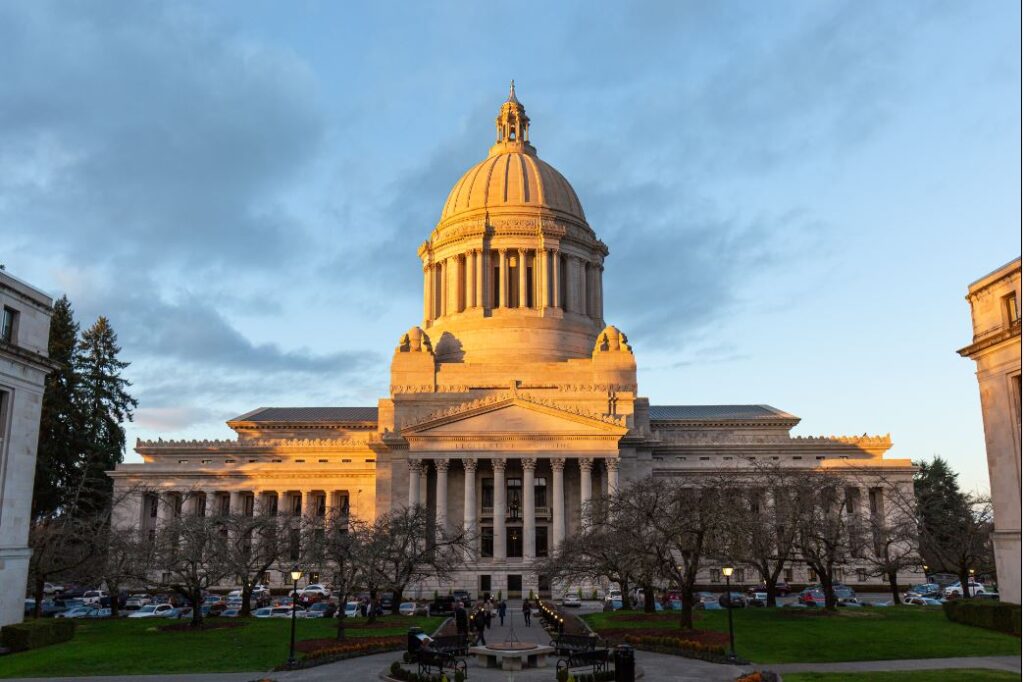Note: The following e-newsletter was sent to Sen. Jeff Wilson’s subscribers March 19, 2024. To subscribe to Sen. Wilson’s updates from Olympia, click here.
 Well-wishers thronged the Senate floor March 7 after the final gavel fell to end our 2024 session.
Well-wishers thronged the Senate floor March 7 after the final gavel fell to end our 2024 session.
Dear Friends and Neighbors,
This year in Olympia, the people reminded us that they are in charge of their government, and not the other way around. As your senator from the 19th Legislative District, I was delighted to see it happen. In this e-newsletter, I want to offer a few final thoughts about our 2024 session.
The ‘Year of the Initiative’
Since 2018, an urban majority in the Legislature has been pushing what it calls a ‘progressive agenda.’ This year the people pushed back. They collected 2.6 million signatures to place six initiatives before the Legislature. These initiatives demonstrated the people’s frustration with higher taxes, a growing crime rate, and a government that thinks it knows better than those it governs.
These initiatives changed the course of the session. Our colleagues’ confidence was shaken. Their agenda faltered. They recognized these initiatives would have broad support if they advanced to the ballot. Ultimately they grudgingly permitted the Legislature to vote on three of them. I was happy to vote yes.
These measures give parents a voice in decisions affecting their children in the public schools (Initiative 2081), prohibit future income taxes (Initiative 2111), and restore the ability of police to chase fleeing suspects (Initiative 2113).
Unfortunately, our colleagues were unwilling to consider the other three initiatives, meaning voters will have the final say in November. These initiatives would repeal the state’s new income tax on capital gains (Initiative 2109), repeal the state’s cap-and-trade program (Initiative 2117), and allow workers to opt out of a mandatory payroll tax for long-term care (Initiative 2124).
Affects other issues
The people’s voice was heard in other areas as well. Whenever a hot-button issue came up for a hearing, thousands of people registered their opinion using the Legislature’s electronic sign-in process. We’ve been using this process for the last several years. But this year, with half-a-dozen initiatives offering a public rebuke, our colleagues seemed to take a greater interest in the public mood.
For instance, local government interests based mainly in King County sought a bill that would allow property taxes to increase three times faster than they already do. Republicans sounded a warning, but the real credit for defeating this measure goes to the people for rising up and making their outrage known. Also defeated were proposals for rent control, an increase in real estate taxes, new authority for the attorney general to block hospital mergers — and many more. For the most part, this was a terrible year for agenda-driven legislation aimed at enhancing government power at the expense of the people. But there were exceptions — just keep reading.
Natural gas bill could cost customers billions
House Bill 1589, easily the worst bill of the year, sets the stage for the state’s largest gas-and-electric utility to phase out natural gas service. This troubling legislation allows Puget Sound Energy to meet arbitrary state emissions goals by forcing costs onto consumers. If state regulators approve, gas prices would skyrocket, and customers would have to replace gas furnaces, water heaters and stoves with electric appliances. Average cost for residential customers would be around $40,000. The cost would be much higher for homeowners who must replace wiring and other equipment. Business and industry also would face punishing costs. Yet this plan would have no measurable impact on world climate, and its main effect would be to eliminate one of our cleanest sources of energy. Republicans unanimously opposed this bill.
How this bill will affect us in Southwest Washington is hard to predict. In the 19th Legislative District, PSE serves just Lewis County, and provides gas only, not electricity. We won’t see its plans until 2027, when it will present them to state regulators. But if this legislation stands, we can expect efforts to force this terrible idea on the entire state. Can our electric grid meet the demand? Can our economy sustain the blow? And will our Legislature continue to pretend it is interested in affordable housing?
So we can’t say this session cured the Legislature of its tendency toward ‘progressive’ policies that send the state backward. But it was a start. To put the state back on the right track, the people will have to make sure the Legislature keeps hearing their voices. This year gives me hope. Let’s keep it up!
Electric vehicle bill is signed into law
Successes and heartbreaks of a session

For me, the problem of EV fires hits close to home. The battery in my 2017 Chevy Bolt was recalled and replaced due to a potential fire hazard.
What do you do when your electric vehicle goes into flame mode? In this early stage of EV technology, battery fires are all too common. Special hazards of EV fires include high voltage, intense heat, toxic fumes and a tendency to reignite. Dousing them can take as much as 6,000 gallons of water, a dozen times more than most fire trucks can carry. Often firefighters decide the best thing to do is to let fires burn.
To address this problem I sponsored Senate Bill 5812, directing the Washington State Patrol to launch an EV firefighting study. I am pleased to report that it was signed into law this morning. This study aims to identify best firefighting practices and the equipment that will be needed as EVs become commonplace. The measure won unanimous support in the House and Senate and quick approval from the governor’s office. Until we get a handle on this problem, the risk of fire will be a major obstacle to EV acceptance.
Justin R. Schaffer Memorial Highway: A segment of State Highway 6 through the community of Adna in Lewis County will be named in honor of State Patrolman Justin Schaffer, under Senate Joint Memorial 8008.
Schaffer was killed March 24, 2020, as he laid out spike strips on Interstate 5 to stop a fleeing robbery suspect. The driver swerved around the spikes and struck Schaffer — today he is serving a 45-year sentence. The measure creates a six-mile remembrance for Schaffer in the community where he grew up. Let us never forget his sacrifice.
 One of my biggest disappointments this year was the last-minute defeat of a $1.5 million appropriation to combat sea lions on Columbia River tributaries. Though funding was included in the Senate budget, House Democratic budget writers were unwilling to fund efforts to control these predators. We’ll need to try again next year — the survival of our salmon runs is at stake. Credit/ Army Corps of Engineers.
One of my biggest disappointments this year was the last-minute defeat of a $1.5 million appropriation to combat sea lions on Columbia River tributaries. Though funding was included in the Senate budget, House Democratic budget writers were unwilling to fund efforts to control these predators. We’ll need to try again next year — the survival of our salmon runs is at stake. Credit/ Army Corps of Engineers.
• Protecting signature gatherers: Signature gathering for initiatives and referendums is a protected political activity under the Washington constitution. That’s why I was disturbed to learn of efforts to disrupt signature gathering for this year’s “six-pack” of initiatives. An unusually well-organized campaign to prevent petitions from being signed was backed by the Washington State Democratic Party, the American Civil Liberties Union, and possibly other organizations. Supporters were encouraged to call a hotline to “report” signature gatherers; activists then showed up at signature gathering sites and staged shouting matches and other confrontations. Senate Bill 5820 would have made it easier to enforce existing laws against harassment by establishing a 25-foot buffer zone around signature gathering activities. Unfortunately, my colleagues were unable to see past the politics of the situation, and this bill did not get a vote in committee.
• Revitalizing the Legislature’s ‘Sunshine Committee’: Public records advocates frequently complain the Legislature doesn’t care about transparency. I am the Senate Republican representative on the advisory committee that oversees public records, and there is some truth to their argument. Last year, after years of legislative snubs, this demoralized advisory committee considered a motion to disband, but decided to remain in place with the hope that the situation might be turned around. I followed up by introducing Senate Bill 5779 to ensure the Legislature would consider the committee’s recommendations. I introduced another bill, Senate Bill 6262, to create a program of regular records releases by state agencies. Well, guess what happened? My colleagues couldn’t see a need for either bill and killed them in committee. I think they helped demonstrate why these bills are needed.
• An official nickname for Washington state: This should have been a slam dunk. We’ve been calling ourselves “The Evergreen State” since the 1890s, and the newspapers of 1893 reported that the Senate voted to make it official. But if that vote happened, no one bothered to record it, and it’s about time we cleared up this 131-year oversight. Senate Bill 5595 would have taken care of the problem. But for the second year in a row, the Senate voted yes and sent the bill to the House, which responded by sitting on it and doing nothing. Do you think House leaders have something against trees?
Thanks for reading — it is an honor serving you.
Sen. Jeff Wilson
19th Legislative District
Contact me!
Email: Jeff.Wilson@leg.wa.gov
Mailing address: P.O. Box 40419 /Olympia, WA 98504
Leave a message on the Legislative Hotline: 1-800-562-6000
To unsubscribe from these regular updates from Olympia, go to the Subscriber Preferences Page below.













